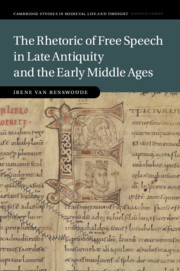Book contents
- The Rhetoric of Free Speech in Late Antiquity and the Early Middle Ages
- Cambridge Studies in Medieval Life and Thought Fourth Series
- The Rhetoric of Free Speech in Late Antiquity and the Early Middle Ages
- Copyright page
- Dedication
- Contents
- Acknowledgements
- Abbreviations
- Introduction
- Part I
- 1 The Steadfast Martyr
- 2 Hilary of Poitiers
- 3 The Detached Philosopher
- 4 Ambrose of Milan
- 5 The Silent Ascetic
- Epilogue Part I
- Part II
- Bibliography
- Index
3 - The Detached Philosopher
from Part I
Published online by Cambridge University Press: 23 September 2019
- The Rhetoric of Free Speech in Late Antiquity and the Early Middle Ages
- Cambridge Studies in Medieval Life and Thought Fourth Series
- The Rhetoric of Free Speech in Late Antiquity and the Early Middle Ages
- Copyright page
- Dedication
- Contents
- Acknowledgements
- Abbreviations
- Introduction
- Part I
- 1 The Steadfast Martyr
- 2 Hilary of Poitiers
- 3 The Detached Philosopher
- 4 Ambrose of Milan
- 5 The Silent Ascetic
- Epilogue Part I
- Part II
- Bibliography
- Index
Summary
This chapter describes how, over the course of the fourth century, Christians took over the role that was traditionally ascribed to the pagan court philosopher, who was defined (at least in the public imagination) by his freedom of speech, disregard for wealth and social conventions, equanimity, and an uncompromising attitude towards political authority. It discusses biographies and histories from the fourth and fifth centuries AD, which recount the lives and deeds of pagan philosophers and Christian holy men. It also analyses one ceremonial speech delivered by the court philosopher Themistius to Emperor Constantius II, showing that a speech of praise could also be a vehicle for advice and criticism. The chapter focuses on the cultural construction, performance and narrative representation of two varieties of political parrhesia, to wit, ‘bold speech’ and ‘privileged access’, that were relevant to the pagan philosopher and later to the free-speaking bishop who followed in his footsteps.
Keywords
- Type
- Chapter
- Information
- Publisher: Cambridge University PressPrint publication year: 2019

